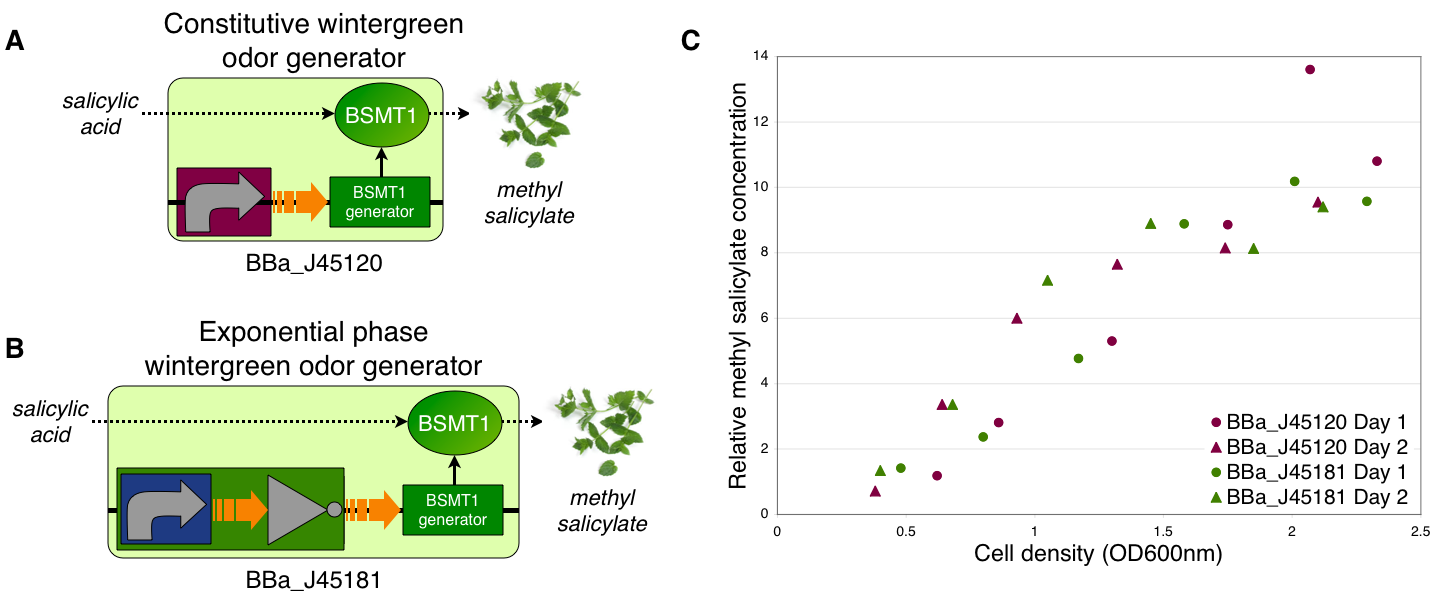Generator
WOG
Part:BBa_J45120:Experience
Designed by: MIT IGEM 2006 Group: iGEM06_MIT (2006-08-10)
This experience page is provided so that any user may enter their experience using this part.
Please enter
how you used this part and how it worked out.
Applications of BBa_J45120
The wintergreen odor generator (BBa_J45120) catalyzes the conversion of the precursor salicylic acid to the odor methyl salicylate that has a wintergreen smell.
User Reviews
UNIQe09b0f9df67e905c-partinfo-00000001-QINU
|
••••• |
The wintergreen odor generator (BBa_J45120) produces a wintergreen odor in culture when supplemented with salicylic acid. |
UNIQe09b0f9df67e905c-partinfo-00000004-QINU
Characterization
Smell test of wintergreen odor generator

Smell tests of cultures of wintergreen and banana odor generators (BBa_J45120 and BBa_J45200, respectively)
At the 2006 iGEM Jamboree, we conducted blind smell tests in which iGEM participants had to distinguish between cell cultures producing wintergreen odor, banana odor and the natural fecal odor of E. coli. Of the 116 respondents, 64% were able to correctly identify the culture producing methyl salicylate through its wintergreen bouquet, 87% were able to correctly identify the culture producing isoamyl acetate through its banana bouquet, and 86% were able to correctly identify the laboratory E. coli strain TOP10 through its stink. The error bars are the specific margin of error at 95% confidence. For the smell tests, we used the odor-free chassis (E. coli strain YYC912) for the wintergreen and banana odor generators.
At the 2006 iGEM Jamboree, we conducted blind smell tests in which iGEM participants had to distinguish between cell cultures producing wintergreen odor, banana odor and the natural fecal odor of E. coli. Of the 116 respondents, 64% were able to correctly identify the culture producing methyl salicylate through its wintergreen bouquet, 87% were able to correctly identify the culture producing isoamyl acetate through its banana bouquet, and 86% were able to correctly identify the laboratory E. coli strain TOP10 through its stink. The error bars are the specific margin of error at 95% confidence. For the smell tests, we used the odor-free chassis (E. coli strain YYC912) for the wintergreen and banana odor generators.
Gas chromatography analysis of wintergreen odor generator

Verification of odor production by wintergreen odor generator
We successfully designed, constructed and tested a biosynthetic device for wintergreen odor production from exogenously supplied precursors. To confirm that the wintergreen odor generator produced the correct smell compound, we analyzed cultures with the device supplemented with 2mM salicylic acid by gas chromatography. The wintergreen odor generator (BBa_J45120) produced high levels of methyl salicylate when we add the precursor salicylic acid to the culture medium (A). The cellular chassis alone (E. coli strain TOP10) did not produce methyl salicylate although we added salicylic acid to the culture medium (B). The retention time of the methyl salicylate peak from BBa_J45120 is identical to that of the pure methyl salicylate standard (C). Most E. coli strains produce indole.
We successfully designed, constructed and tested a biosynthetic device for wintergreen odor production from exogenously supplied precursors. To confirm that the wintergreen odor generator produced the correct smell compound, we analyzed cultures with the device supplemented with 2mM salicylic acid by gas chromatography. The wintergreen odor generator (BBa_J45120) produced high levels of methyl salicylate when we add the precursor salicylic acid to the culture medium (A). The cellular chassis alone (E. coli strain TOP10) did not produce methyl salicylate although we added salicylic acid to the culture medium (B). The retention time of the methyl salicylate peak from BBa_J45120 is identical to that of the pure methyl salicylate standard (C). Most E. coli strains produce indole.
Wintergreen odor production as a function of cell density

Growth phase dependent wintergreen odor production
To demonstrate growth phase dependent wintergreen odor production, we compared the behavior of constitutive and exponential phase dependent wintergreen odor generators (A and B, respectively). We measured methyl salicylate concentration (relative to the pentachloronitrobenzene internal standard) of cultures of the constitutive and exponential phase wintergreen odor generators at different culture cell densities (OD600nm) (C). The constitutive and exponential phase wintergreen odor generators produced similar levels of methyl salicylate at all cell densities examined. Thus, the exponential phase wintergreen odor generator does not work as intended.
To demonstrate growth phase dependent wintergreen odor production, we compared the behavior of constitutive and exponential phase dependent wintergreen odor generators (A and B, respectively). We measured methyl salicylate concentration (relative to the pentachloronitrobenzene internal standard) of cultures of the constitutive and exponential phase wintergreen odor generators at different culture cell densities (OD600nm) (C). The constitutive and exponential phase wintergreen odor generators produced similar levels of methyl salicylate at all cell densities examined. Thus, the exponential phase wintergreen odor generator does not work as intended.

 1 Registry Star
1 Registry Star